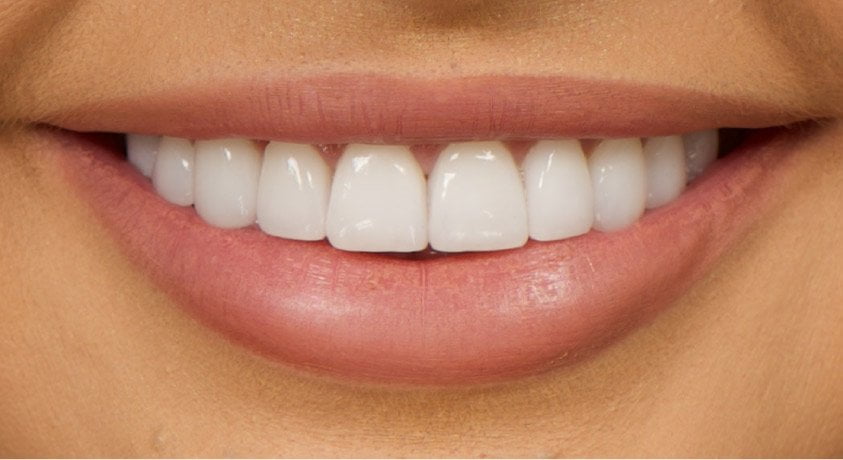
Dental veneers are a significant treatment method chosen for both aesthetic and functional needs. However, experiencing mild aches, especially during the healing process after the veneering procedure, can be normal. This condition is usually temporary and decreases over time.
However, the answers to “why do veneered teeth ache?” may not always be limited to temporary processes. Decay or inflammation of the tooth under the veneer, recession or inflammation of the gums, the veneer not fitting perfectly to the gums, bad habits like teeth grinding or clenching, excessive trimming of the tooth under the veneer, and finally, cracking or breaking of the veneer itself are among the main reasons behind the aching sensation in veneered teeth. Below, we have listed the problems that can cause aching in veneered teeth.
1. Decay or Inflammation of the Tooth Under the Veneer
Even though veneered teeth offer numerous aesthetic and functional advantages, they can lead to problems such as aching and pain in some cases. One of these problems is the decay or inflammation of the tooth under the veneer.
The veneer, although acting as armor protecting the tooth against external factors, bacteria can infiltrate from the edges of the gums or the gaps between the veneer and the tooth, leading to tooth decay. Decay under the veneer usually stems from causes such as gum recession, gum inflammation, or inadequate oral hygiene.
The tooth under the veneer can also become inflamed due to reasons like gum inflammation or gum recession. Bacteria accumulating between the veneer and the gum can lead to gum inflammation and recession, causing sensitivity and aching in the root of the tooth.
2. Gum Recession or Inflammation
Gum recession or inflammation is a significant reason behind aching in veneered teeth. Gum recession refers to the condition where the gum recedes downwards from the tooth surface, exposing the root of the tooth and making the tooth more sensitive. Gum recession or inflammation, especially in veneered teeth, can lead to both aesthetic and health problems. Incompatibility of the veneer edges with the gum, the gum not adhering perfectly to the veneer, or bacterial entry from micro gaps under the veneer can cause gum inflammation and subsequently recession.
Gum recession is one of the primary factors causing aching and pain in veneered teeth. This is because the receding gum exposes more sensitive parts of the tooth, allowing hot, cold, sweet, or sour foods to penetrate the tooth more easily. Preventing and treating gum recession is possible with regular dental check-ups before and after veneering. Additionally, regular cleaning of the dental veneers and surrounding gums is critical for maintaining gum health.
3. The Veneer Not Fitting Perfectly to the Gums
A veneer not fitting perfectly to the gums can cause aching and other dental problems in veneered teeth. This situation arises when the veneer is not correctly placed on the tooth or due to minor shifts over time.
An ideal veneer should fully cover the tooth and fit perfectly with the surrounding gums. However, when the veneer does not fit perfectly, microscopic gaps can form between the tooth and the gum. These gaps allow for bacterial accumulation, leading to decay, gum inflammation, and infections in the lower parts of the tooth.
The aching caused by a veneer not fitting perfectly can be especially felt when consuming hot or cold foods or when pressure is applied to the tooth. This situation increases the sensitivity of the underlying tooth tissue, causing pain. Additionally, the gap between the veneer and the natural tooth may not be fully cleaned with brushing and flossing, paving the way for oral hygiene issues and more severe gum diseases.
The solution to this problem generally involves the dentist adjusting the veneer or replacing it with a new one if necessary. Adjustments made for the veneer to fit correctly help better protect the tooth and significantly reduce issues like aching.
4. Teeth Clenching or Grinding Problem
Teeth grinding or clenching, medically known as bruxism, is an unconscious act often performed at night and is one of the main reasons behind aching in veneered teeth and many other dental issues. This condition creates excessive pressure and friction on the teeth, damaging the veneer material and the natural tooth tissue underneath. Consequently, wear on the teeth, cracks or breaks in the veneers, and even gum recession can occur.
The excessive pressure caused by bruxism can also lead to changes in the structure of the teeth and jaw joints. This can manifest as symptoms such as aching in veneered teeth, jaw pain, headaches, and tension in facial muscles. For individuals with a teeth grinding or clenching problem, the lifespan of veneers can be significantly shortened, necessitating more frequent replacement.
Various treatments are available for bruxism. Dentists typically recommend a custom-made night guard for use, especially at night. These guards prevent teeth from coming into contact with each other, mitigating excessive pressure and protecting the teeth and veneers. Furthermore, stress management techniques, muscle relaxation exercises, and if necessary, muscle relaxant medications can also help alleviate the discomfort caused by bruxism.
5. Excessive Trimming of the Tooth Under the Veneer
During veneering procedures, a certain amount of the tooth needs to be trimmed to ensure the veneer fits correctly. However, excessive trimming of the tooth under the veneer can lead to aching in veneered teeth and other adverse outcomes. This situation is characterized by the removal of an excessive amount of the tooth’s protective outer layer, the enamel, exposing the tooth’s more sensitive areas.
Excessive trimming can harm the underlying dentin layer or even the pulp region of the tooth, causing the tooth to develop extreme sensitivity to hot, cold, sweet, or sour stimuli, leading to aching.
In teeth that have been excessively trimmed, the post-veneering adaptation process can be more challenging, and the risk of inflammation of the tooth’s pulp area (pulpitis) increases. Pulpitis, if untreated, can lead to root canal infection and tooth loss. Additionally, the excessive trimming of the tooth can weaken the tooth’s structure, negatively affecting the long-term success of the veneer and increasing the likelihood of tooth fracture.
6. Cracking or Breaking of the Veneer
Cracking or breaking of the veneer in dental treatments is a common problem and can cause aching and pain in veneered teeth. Veneers are artificial coverings used to improve the tooth’s form, function, and aesthetic appearance. However, these veneers can be damaged over time for various reasons. Cracks or breaks can occur due to improper application techniques, material defects, applying excessive force (e.g., biting hard foods), habits like teeth grinding or clenching, and wear and tear of the veneer material.
Cracking or breaking of the veneer leaves the tooth tissue under the veneer unprotected against external factors. This, especially when the tooth’s sensitive areas are exposed, can lead to extreme sensitivity and aching in response to hot, cold, sweet, or sour stimuli. Additionally, cracks or breaks can lead to bacterial accumulation, causing further problems such as tooth decay or gum inflammation.
Is Pain or Aching Normal After Getting a Veneer?
Yes, experiencing mild pain or aching in the first few days after getting a veneer is normal and usually decreases within a few days.
The pain or aching experienced after getting a veneer is generally mild to moderate and decreases within a few days. Pain relievers recommended by your dentist can be used to manage the pain during this process. If the pain is severe or lasts longer than a week, this is considered abnormal, and consulting a dentist is necessary.
How Long Does Veneer Tooth Pain Last?
Veneer tooth pain mostly lasts for a few days to a week and can start with the beginning of the treatment.
Can the Tooth Under the Veneer Decay?
Yes, the tooth under the veneer can decay. A veneer is a protective covering placed over the tooth, and if not properly maintained, small gaps between the veneer and the gum can lead to bacterial accumulation, causing the bacteria to lead to tooth decay.
If you are looking for an expert team for emax veneers in Turkey, Alyans Clinic, our dental clinic in Kadıköy, is at your service with its expert dentists.


